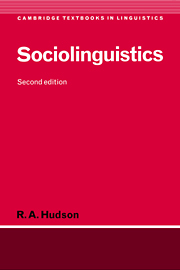6 - Linguistic and social inequality
Published online by Cambridge University Press: 05 June 2012
Summary
Linguistic inequality
Introduction
One of the most solid achievements of linguistics in the twentieth century has been to eliminate the idea (at least among professional linguists) that some languages or dialects are inherently ‘better’ than others. Linguists recognise that some varieties of language are considered by lay people to be better than others, but they point out that each variety displays characteristics common to all human language, such as being complex and rule-governed, and that even the least prestigious language varieties reveal an impressively rich set of structural patterns. Linguists would claim that if they were simply shown the grammars of two different varieties of a completely unfamiliar language, one with high and the other with low prestige, they could not tell which was which.
Moreover, most linguists would probably say the same about linguistic differences between individual speakers: if there are differences between the grammars of two people, there is no way of knowing which has the higher prestige in society simply by studying the grammars. Admittedly there are individuals who clearly have inherently incomplete grammars, such as small children, foreigners and people with mental disabilities, but these deviations are easy to explain and predict, and leave intact the claim that all normal people are equal with regard to their grammars. Of course, there is no shortage of differences between grammars, whether of individuals or whole communities, but there are no purely linguistic grounds for ranking any of the grammars higher than others.
- Type
- Chapter
- Information
- Sociolinguistics , pp. 203 - 227Publisher: Cambridge University PressPrint publication year: 1996
- 1
- Cited by



